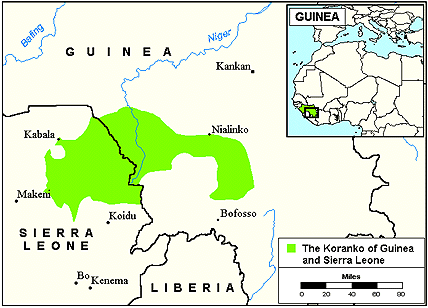|
|
Prayer Profile
The Koranko of Guinea
![[IMAGE]](../images4/0663.jpg) The Koranko are a branch of the Malinke tribe who occupy a large section in both southern Guinea and Sierra Leone. Within this geographical region, different dialects, as well as distinct social groupings, can be found. In general, the Koranko are a peaceful people who have maintained a separate ethnic identity, despite years of tribal mixings.
The Koranko are a branch of the Malinke tribe who occupy a large section in both southern Guinea and Sierra Leone. Within this geographical region, different dialects, as well as distinct social groupings, can be found. In general, the Koranko are a peaceful people who have maintained a separate ethnic identity, despite years of tribal mixings.
The Koranko occupy the savanna and tropical forests of the southeastern Guinea Highlands. The climate there is hot and humid throughout the year. The region lacks adequate road systems and is not easily accessible, leaving the Koranko socially isolated. This may explain why most have held on to their traditional culture and religion.
The Koranko speak Kuranko (or Koranko), a dialect of the Mende branch of the Niger-Congo language family. The language can be understood by the neighboring Malinke and Susu peoples.
What are their lives like?
The Koranko are primarily subsistence farmers. Rice is the main crop cultivated, although the humid savanna woodlands also yield cotton, peanuts, corn, and coffee. Each household also owns fruit trees around the village, which produce bananas, papayas, mangos, and other fruits.
Typically, the Koranko live in thatch roofed houses that are made of circular walls of poles and elephant-grass canes. The poles have been covered with mud and layers of grass. The homes belong to the men, who are the providers. The women are responsible for preparing meals for their families.
To the Koranko, a child is not considered to be a complete person and is considered impure and dirty. Childhood for a boy or girl lasts until puberty. At this time, a ritual purification ceremony, called a biriye, ushers them into adulthood.
An adult is expected to show honor and respect for the customs of the Koranko past. This may be demonstrated by joining various cult associations. The Gbansogoron ("cheek piercers") use self-inflicted pain as a way of showing bravery. The Segere is a women's cult that supports and defends the rights of women.
What are their beliefs?
Less than one-third of the Koranko in Guinea are Muslim. The majority of the others (70%) follow their traditional ethnic religion. They sometimes think of "the wild" as opposite to village life, and they use animal metaphors to identify evildoers. Someone without faith is likened to a dog; one who steals is as a monkey; and a traitor is as a snake. The Koranko believe that certain people can change into animals to harm others. Certain animals, such as vultures, bats, and black cats symbolize witchcraft.
The Koranko believe that in the forests, the rivers, and the mountains live quasi-human beings known as Nyenne. These are "bush spirits," who are believed to influence Koranko life in different ways.
The Nyenne are rarely seen but are somewhat feared. They are thought to live in the bush near the villages, and are said to live as humans: in houses with their families. A Koranko will make a sacrifice to one of these Nyenne when clearing land for his farm. It is believed that the Nyenne can make women barren, cause insanity, and cause farming accidents. The Koranko also believe that they can be friendly, bringing good fortune.
What are their needs?
The New Testament has already been translated into the Kuranko language, and one missions agency is currently working among this people group. However, few Koranko have responded to the Gospel message. Today, less than 1% of the Koranko in Guinea have accepted Jesus as their Savior.
At the present time, there are no Christian radio or television programs being aired in the Kuranko language. There is a strong need for further evangelization into this socially isolated region. Prayer is the first step toward seeing them reached with the Light of the Gospel.
Prayer Points
- Ask the Holy Spirit to grant wisdom and favor to the missions agency that is currently targeting the Koranko.
- Ask the Lord of the harvest to send forth additional laborers to work among the Koranko of Guinea.
- Pray that the Lord will reveal Himself to the Koranko through dreams and visions.
- Pray that God will give the Koranko believers boldness to share Christ with their own people.
- Take authority over the spiritual principalities and powers that are keeping the Koranko bound.
- Ask God to raise up prayer teams who will break up the soil through worship and intercession.
- Pray that Christian radio broadcasts, evangelical literature, and the Jesus film will soon be made available to the Koranko.
- Ask the Lord to bring forth strong local churches among the Koranko.

See also the following group:
The Kuranko of Sierra Leone;
Statistics
Latest estimates from the World Evangelization Research Center.
THE PEOPLE
- People name: Koranko
- Country: Guinea
- Their language: Kuranko
- Population:
- Largest religion:
- Christians: <1%
- Church members: 187
- Scriptures in their own language: New Testament
- Jesus Film in their own language: None
- Christian broadcasts in their own language: None
- Mission agencies working among this people: 1
- Persons who have heard the Gospel: 15,800 (26%)
- Persons who have never heard the Gospel: 46,600 (74%)
THEIR COUNTRY
- Country: Guinea
- Population:
- Major peoples in size order:
- Major religions:
- Number of denominations: 10
© Copyright 1997
Bethany World Prayer Center
This profile may be copied and distributed without obtaining permission
as long as it is not altered, bound, published
or used for profit purposes.
![[HOME BUTTON]](../graphics/home.jpg)
![[CALENDAR BUTTON]](../graphics/calico.jpg)
![[LIST BUTTON]](../graphics/listico.jpg)
[Home]
[Calendar]
[Country List]
|